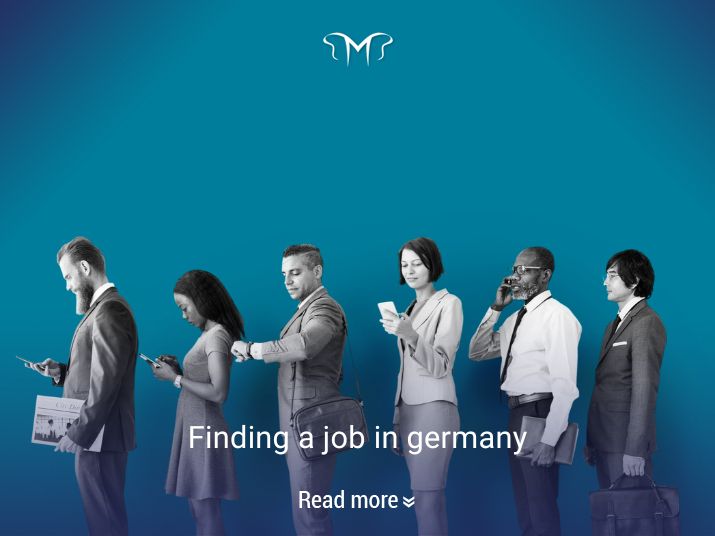
Finding a Job in Germany: Challenges and Opportunities
Finding a job in Germany comes with many challenges and opportunities. As one of the world's leading industrial hubs, Germany offers a dynamic environment for professional growth and welcomes the diverse skills and perspectives that immigrants bring, enriching the country's workforce. Whether you're exploring job opportunities in engineering, medicine, or any other field, Germany's strong economy and commitment to innovation provide a promising landscape for career advancement. In this article, we will explore the German job market, salaries and benefits, work culture, and various steps to take. Join us as we dive in.
Understanding the German Job Market
Germany, with a population of 84.3 million, is the largest economy in the European Union and the fourth largest globally, following the United States, China, and Japan. Currently, 55.1% of the workforce in Germany is employed by small and medium-sized enterprises (SMEs), and the job market demands highly educated individuals with professional qualifications. If you hold a recognized degree in the following fields, finding a job in Germany may not be too difficult:
- Medicine: There is a high demand for doctors in private practices and sometimes in clinics, especially in rural areas.
- Nursing: Qualified nurses are needed in hospitals, nursing homes, and other care facilities.
- Engineering: Germany offers abundant job opportunities and excellent earning potential for engineers. Jobs in fields such as electrical engineering, civil engineering, mechanical engineering, and automotive engineering are attainable for Iranians.
- Computer Science: There are many vacancies in STEM fields (science, technology, engineering, and mathematics) in both the private sector and public research institutions.
Other job opportunities in Germany can range from simple positions such as working in municipal and church kindergartens, driving for freight companies and municipal institutions, cooking, agriculture, and similar fields, to demanding jobs requiring extensive technical and professional skills. However, Germany faces a significant challenge: a shortage of skilled workers. This shortage affects many sectors, from healthcare and engineering to IT and other professions, and is crucial for maintaining economic stability and growth.
Over the past few decades, the German job market has seen significant fluctuations in employment rates. Recent forecasts indicate that the workforce may be shrinking. As of 2023, about 45.8 million people were employed in Germany, but the country still faces a considerable labor shortage. Germany is working to mitigate the impact of this shortage by welcoming skilled migrants to ensure sustained economic growth.
In-Demand Jobs in Germany
The labor shortage in Germany is more pronounced in certain fields. If you are planning to work in Germany and have a degree in one of the following areas, your chances of success in securing a job are higher:
- Healthcare: Including general practitioners, specialists, nurses, midwives, dentists, pharmacists, physiotherapists, dietitians, optometrists, and other health-related professions.
- Engineering and Technology: Including mechanical, electrical, civil, industrial, chemical, and mining engineers, as well as system analysts and network specialists.
- Skilled Trades: Including truck drivers, warehouse operators, construction supervisors, electricians, plumbers, and carpenters.
- Education: Including university professors and teachers.
Requirements for Working in Germany
Your nationality and specific circumstances determine the eligibility criteria for finding employment in Germany. Anyone seeking work in Germany can apply for a work permit. However, the application process and requirements vary based on the country of origin.
For non-EU citizens, the German work visa application process involves several steps, which we will discuss in detail. First, let’s see which option best matches your situation for employment in Germany:
- Work Visa: If you have a job offer from a German employer, a work visa allows you to work in Germany. This visa is specific to your job role and ensures that an EU citizen cannot fill the position.
- Freelance Visa: If you are self-employed and can carry out a viable business plan with potential clients, a freelance visa is suitable for independent work in Germany.
- Job Seeker Visa: For those looking to explore job opportunities in Germany, a job seeker visa provides a limited period to find a job and secure a suitable job offer.
In Germany, health insurance is mandatory for all employees, and working conditions often require proof of health insurance to obtain a work visa and residence permit. This is available in two forms: statutory (public) health insurance and private health insurance. Employees earning below a specified threshold (currently €66,600 per year) must have statutory health insurance. Income exceeding this threshold qualifies for private health insurance.

Salaries and Benefits in Germany
German labor laws establish the fundamental basis for work relationships, outlining essential terms and conditions. These laws cover various aspects of different types of contracts with varying work conditions. Contracts detail working hours, salaries, benefits, and responsibilities. Some contracts include specific clauses for part-time or fixed-term work, making it essential to understand the contract fully before signing.
If needed, you can request a translation of the contract. Once you understand the terms, any changes to the contract must be mutually agreed upon. It is advisable to seek legal advice to ensure your rights are understood and protected.
The minimum wage in Germany is €12 per hour, and the average workweek ranges from 36 to 40 hours. Full-time jobs typically involve 7 to 8 hours of work per day across 5 workdays, often including a lunch break of about 30 minutes to 1 hour.
Some companies may have longer workweeks, often compensating employees with higher pay or additional annual leave. Self-employed individuals often work more than the maximum of 48 hours per week, and those working less than 30 hours per week are classified as part-time employees.
The minimum annual leave entitlement in Germany is 24 working days (equivalent to a 6-day workweek, excluding Sundays). However, employers often provide more annual leave, ranging from 25 to 30 days. Full leave entitlement is effective after more than 6 months of employment. If termination occurs before 6 months or in the first half of the year, the employee is entitled to one-twelfth of the annual leave for each month of service. If termination occurs after the first 6 months and in the second half of the calendar year, the employee is entitled to the full annual leave.
Pregnant mothers in Germany are exempt from work as they approach childbirth (six weeks before and eight weeks after delivery). Maternity leave automatically starts, though it may be delayed for medical reasons. During this period, women receive maternity pay equivalent to their earnings three months prior to the leave. Parents, regardless of gender, are entitled to parental leave until the child is 3 years old. This applies to working parents with employment contracts in Germany. Up to 24 months of this 3-year period can be postponed until the child is 8 years old.
Germany's Continuous Payment Act ensures job security for employees during illness. If an employee is unable to perform contractual duties due to disability or illness, they can take leave. Immediate notification to the employer is essential, and a medical certificate is required if the absence exceeds three consecutive days.
According to German labor laws, employers must pay 100% of the employee's salary or wages during the first six weeks of illness. These regulations can apply several times a year under specific conditions. The right to sick leave is limited to a maximum of six weeks per year, with potential extensions under special circumstances. To access this right, at least four weeks of work with the employer is necessary. Additionally, German employees are granted up to 10 days of leave to care for sick family members.

Work Culture in Germany
Germany enforces strong measures to combat workplace discrimination. The General Equal Treatment Act (AGG) prohibits discrimination based on gender, age, ethnicity, and religion. Equal pay for equal work is mandatory, and employers must ensure unbiased hiring, promotion, and working conditions.
Harassment, including sexual harassment, is strictly forbidden. Employers must accommodate employees with disabilities and establish mechanisms to address discrimination-related complaints. Individuals facing unfair treatment can report to relevant authorities and receive legal remedies to effectively combat such situations.
The German work culture is renowned for its emphasis on punctuality, efficiency, and high-quality work. Employees are expected to adhere to set schedules, meet deadlines, and take job responsibilities seriously. The work environment typically features a hierarchical structure with clear lines of authority and communication. Respect for authority and adherence to protocols are integral to the work culture.
Furthermore, the German work culture heavily emphasizes continuous education and professional development. Lifelong learning is encouraged, and employees often participate in training programs and workshops to enhance their skills and knowledge. Expertise and specialized knowledge are highly valued, and individuals with deep knowledge in their field are often regarded as authorities and leaders in their respective areas. Indeed, Germany’s commitment to delivering high-quality products and services is deeply rooted in its work culture.

7 Essential Steps for Working in Germany
Germany is one of the wealthiest countries in Europe and a popular destination for skilled professionals and workers seeking employment. The strong economy, low unemployment rate, and robust social welfare system attract job seekers from around the globe. However, like many countries, Germany has unique laws and regulations for applying and obtaining work. Below, we will discuss the main stages of job searching in Germany.
Step 1: Determine if you need a visa to work in Germany
Before starting your job search, it's important to first determine if you need a visa to work in Germany. A quick check on the Make it in Germany website will show whether professions such as medicine, nursing, engineering, mechatronics technicians, IT specialists, and train drivers require a work visa.
Step 2: Determine the type of visa based on your situation
You will need a visa to work in Germany. You can apply for a visa at the German Embassy in Iran. You will also need your passport, a job offer letter, and other required documents. Available visas and work permits depend on your qualifications and the nature of the job you need, including:
- Job Seeker Visa: This visa allows you to search for a job for up to 6 months.
- EU Blue Card: This work permit is for highly skilled professionals with a university degree or equivalent, allowing you to work and live in Germany for up to 4 years, after which you can apply for permanent residence.
- Work Visa: If you have a job in Germany, your employer usually applies for a work visa on your behalf.
Step 3: Review the required documents
For some professions, Iranian educational or professional credentials need to be officially recognized in Germany. You can check on the Recognition in Germany website to see if this applies to you. If you have a recognized higher education degree in Germany, you can obtain a 6-month visa for job hunting.
Step 4: Choose the best city for work
Research which cities are recognized in your field of work. For example, Berlin and Munich are industrial centers, and Frankfurt is the economic center of Germany. Also consider the cost of living; cities like Berlin and Leipzig are more affordable than Munich or Hamburg. Larger cities usually have better public transportation networks. Evaluate cultural amenities, nightlife, outdoor activities, and overall quality of life in each city. Cities like Munich are renowned for their high quality of life. Consider your personal preferences, such as climate or lifestyle.
Step 5: Find a job or employer in Germany
The job listings on the Make it in Germany website help you navigate the job market in this country. You can also search for job opportunities on the Federal Employment Agency website or business networks like LinkedIn or Xing. If you are interested in specific companies, directly visit their corporate websites to look for vacancies.
Websites like Monster, Stepstone, and Indeed have job listings for various roles across Germany. If you work in a specific industry or profession, joining relevant associations can help. These associations often have job boards and networking events to assist you in finding your desired job. Recruitment agencies in Germany are also reliable options for job hunting in the country.
Update your resume and LinkedIn profile
Typically, applying for a job at a German company involves a cover letter, a resume with a photo, and relevant certificates. You can include all these in your LinkedIn profile. This makes you appear more professional. German employers value attention to detail and accuracy, so an attractive resume has a positive impact on your application. LinkedIn is widely used in Germany for professional networking and increases your visibility among German employers. Remember that proficiency in German, especially for communicating with colleagues and employers, is highly valuable.
Use online job portals
Identify and register with specialized job portals in Germany to find the best job opportunities. Fill in all relevant sections, including personal information, work experience, education, skills, and languages, and highlight your career goals. Specify job title, field of work, location (e.g., city or region in Germany), and other relevant filters to browse listings and find suitable opportunities.
Network
Mastering German language can be an advantage in networking in the job market of this country, indicating your commitment to long-term life and work. Participate in industry events, join professional associations, and connect with different individuals on LinkedIn, Facebook, or Twitter.
Be prepared for interviews; as job interviews in Germany are more formal and structured than in other countries. Research the company and the job you are interested in, and be prepared to answer questions about your qualifications and experience in advance. Nevertheless, finding a job in Germany may take longer than you think; so be patient and give yourself the opportunity.
Use professional recruiters
Getting help from professional recruiters can be an effective strategy for entering this country's job market, especially if you are looking for specialized roles. Therefore, it is better to identify recruitment agencies working in your industry or field of expertise. Look for agencies with a strong presence and network in Germany. Update and format your resume (CV) to highlight your skills, experiences, and achievements and align with German standards.
Contact professional recruiters directly through websites, LinkedIn, or other relevant networks and introduce yourself professionally. Many recruitment agencies participate in job fairs and networking events in Germany. Attend these events to have face-to-face conversations with recruiters about potential opportunities and clearly share your career goals and preferences with them.
Step 6: Start your early application
The hiring process in Germany involves receiving resumes and certificates, interviews, assessment tests, and similar matters; therefore, after submitting your application, you should follow up to learn about new job opportunities. Also, respond promptly to any requests from employers for more information or interviews, and finally, wait for the employer's response.
Step 7: Obtain a visa to enter Germany
To enter Germany, you must have a visa. Your visa will be available to you after completing the legal process. When you arrive in Germany, you must register your address at the local registration office (Einwohnermeldeamt) and provide your passport, residence permit, and residence certificate. You also need a bank account in Germany to receive wages and conduct financial transactions, which you can open by visiting a local bank branch and presenting your passport and residence permit. Afterward, it is time for compulsory health insurance, which you must arrange through insurance companies before starting work. The best type of health insurance is TK insurance. After completing all these steps, you can start working in Germany. Remember to follow the laws and regulations of working in Germany, as Germans live according to the laws and regulations of life.

Closing remarks
To find a job in Germany, you must review various job opportunities and connect with their support networks. You should also be aware of the conditions, rights, benefits, and work culture in Germany. In this article, we tried to help explain all the main stages for job hunting in Germany for Iranians. What suggestions do you have to add to this article? Let us know.


